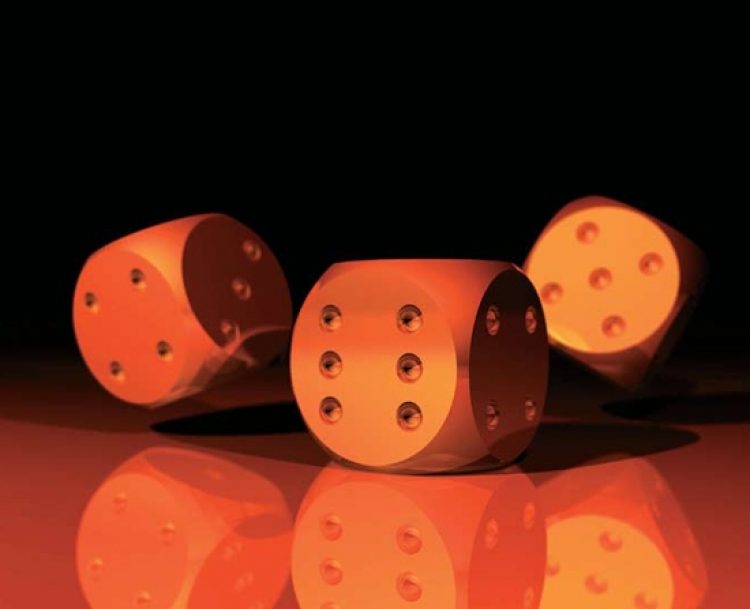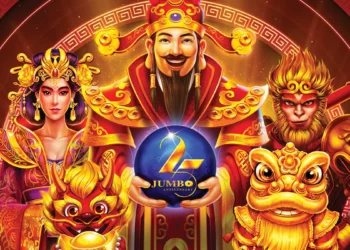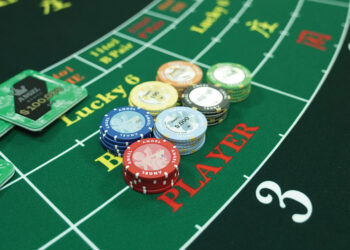A gaming law ruling on sic bo pay outs in Macau has got some manufacturers worried for the future of electronic games in the territory
A ruling on sic bo pay outs by Macau’s gaming regulator the Gaming Inspection and Coordination Bureau (DICJ) could have wider implications for the future of electronic games in the market, according to some manufacturers.
In essence, the decision means automated sic bo games are now required to offer the same odds and pay outs as live tables. Previously on some bets some automated tables had been offering superior odds and pay outs compared to live tables—apparently without any complaints or enforcement action from the DICJ. Electronic sic bo machines in Macau had been able to offer odds on any triple bet (the upturned face of the three dice showing the same number simultaneously) of up to 190-1, according to some industry sources.
By contrast, the maximum pay out allowed on live sic bo games in Macau is 150-1. Inside Asian Gaming understands notices went out recently to suppliers and casino operators informing them about the change to a table odds regime and all the relevant sicbo electronic games on the floor have been adjusted accordingly.
The ruling hasn’t destroyed the commercial case for automated sic bo. Even with odds and pay outs on a par with live sic bo, automated sic bo still offers the prospect of better margins for operators than the live table version. That’s because of its lower overheads (for example there’s no need to hire three dealers a day in eight-hour shifts to man it). In return for the valuable right to ply their lucrative trade, casino operators and casino equipment suppliers are occasionally required to accept gaming law decisions they don’t especially like. So why is this ruling apparently causing so much fuss? Essentially it’s because of the way and the circumstances in which it’s been made, according to some voices from the supplier side of the industry.
The sic bo pay out issue arose after Sands China introduced Rapid Sic Bo at its Venetian Macao and Sands Macao properties—a product with a live ‘dealer’ but electronic betting and electronic bet settlement.
When the DICJ told the company that permissible pay outs on the product would be the same as on a live table, Sands China pointed out that other automated sic bo games in the market were allowed to offer superior pay outs on some bets and that therefore Rapid Sic Bo would be at a competitive disadvantage. Players of live sic bo wouldn’t have any incentive to switch to Rapid Sic Bo, nor would players of the fully automated version. When Sands China made representations to the DICJ, the regulator’s answer was not to switch Rapid Sic Bo onto automated game odds, but instead to switch all automated sic bo tables to a live table pay out regime. A supplier spoken to by IAG says the supply industry is concerned about the implications of this DICJ ruling. “It’s not a question of bashing the DICJ on this game pay out question,” says the supplier.
“The DICJ moved in a way it thought was appropriate. The issue is did they give it sufficient thought? For example, if a manufacturer has jackpot bonuses on his electronic sic bo product that aren’t allowed on a live table, does that mean those bonus features have to go as well? And does this ruling stop at sic bo, or could it be applied to other games such as video card games, baccarat and both video and fully automated roulette?” asks the supplier.
The supplier adds that even if the DICJ’s aim is to standardise pay outs on all derivative forms of table sic bo, there’s an additional problem. Table sic bo in Macau has variations.
“There are at least two layouts for table sic bo with different odds and not all winning combinations are available on various tables,” says the supplier.
The person adds other suppliers also feel the incident is evidence that the Macau industry is not the three-way partnership between the government (represented by the regulator), the casino operators and the equipment makers that they had hoped for at the time of market liberalisation back in 2002. Some are frustrated in particular by the fact they cannot make representations or provide information about their products directly to the local regulator, but instead must rely on the operators to make the case for them. The suppliers worry that while operators act in good faith in their advocacy role, their knowledge of the products may not be as detailed as that held by the manufacturer. Because slots and electronic games only generate a small percentage of their total revenues in Macau, casino operators are naturally likely to focus most of their diplomacy and lobbying efforts with the government and DICJ on protecting their interests in the live table segment. Only 4.7% of gross revenue for games of fortune in Macau came from slots and electronic games in the first quarter of this year.
At the heart of the problem is that—more than nine years after market liberalisation—the government has not promulgated a regulation dealing with electronic gaming machines. This means there is no basis in law for the DICJ to have a regulated relationship with equipment makers; only with the concessionaires and the junket operators. That’s why the DICJ doesn’t get involved in direct communication with, and submissions from, manufacturers. Product approvals must be conducted through the concessionaires, since they are the entities over which DICJ has regulatory jurisdiction.
IAG approached the DICJ for a comment on the lack of electronic regulations in Macau and the other points raised in this story. At the time the magazine went to press, no comment was available. Other sources point out that Macau does have published regulations for table games, and that those regulations include sic bo, albeit under another name.
“Under Law 16/2001 [Macau’s general legal framework for the local gaming industry] sic bo is listed under Article 3,3 as a table game, under the name ‘cussec’,” explains a gaming law expert.
“My view is that since a machine version of a table game—e.g. sic bo—is a derivative of that table game, there can be no case for differential odds. The markets for machine and table games are, in my view, quite different, and will remain so. You may well ask why there is a slot machine market at all in Macau, never mind one generating US$1 billion in annual revenue, given there is no regulated minimum return to player on slots. The point is, I suppose, that people’s game preferences are not necessarily driven by the odds offered. If that were not the case, everyone would be playing baccarat,” adds the gaming law expert.
A supplier speaking to IAG on condition of anonymity backs the gaming law expert’s view that if a product has a live dealer it should be considered a live table—but differs from the gaming law expert regarding the best fix for the issue.
“The DICJ’s position on live dealer automated sic bo makes sense,” said the source.
Definitions
“I think what they should say is any game with a dealer is a live game irrespective of how many terminals it’s got, and anything that’s fully automated is a machine,” says the supplier.
Crucially, however, the supplier adds: “I think the DICJ should have stuck to its guns, rather than forcing the rest of the market to fall in line with Sands China’s Rapid Sic Bo product.
“If Sands China didn’t like its live dealer automated games being regulated as table games, it should have potentially applied to the DICJ for amendment of the rules whereby they [the operator] could pay out different values. The DICJ then could have taken a view. I think all the controversy has forced the DICJ to take an overall view which I think encompasses elements that are incorrect.” But the gaming law expert stresses the DICJ is being consistent and following international standards.
“This approach that a machine version of a table game is a derivative is not a unique view of the world. The state of Victoria in Australia has operated under a similar regime for years. It is certainly defensible as a method of bet placement or settlement. Electronic table games do not use random number generators. They use the same mechanics and rules as the approved table version of the game. The presence of a dealer is part of those mechanics,” adds the source.
The supply industry source asks if that is the case, why did the DICJ previously allow more generous pay outs on electronic games—specifically on fully automated sic bo products? This source argues that’s evidence that until now the DICJ had accepted the principle that automated electronic games were a special case—neither a slot nor a table game.
“On the one hand the DICJ is asking laboratories testing machines for the Macau market to work on the basis of a minimum 85% return to player [RTP].
That’s happening even if technically and legally there’s no regulated minimum RTP for slots in the Macau market. But on the other hand the DICJ is now imposing table level pay outs on some of those previously compliant sic bo games,” says the supply industry source.
“For instance, with the ‘three of a kind’ prizes—from three ‘ones’ up to three ‘sixes’— most [ ] machines in the market have until now been operating at 190-1 [odds].
That gives a pay back to the players of 87.96%. That’s slightly in advance of the minimum 85% for machines. But when you go down to 150-1, the pay back [to players] is 69.44%. That’s below the regulated pay back for a machine. So if someone only ever played the ‘three of a kind’ bet, they would be totally disadvantaged on a sic bo machine regulated as a live table,” adds the supply industry insider.
But the gaming law expert rejects this assertion.
“Firstly, to my knowledge there is no 85% (whether minimum or absolute) RTP ‘requirement’ for slots in Macau. Even if that were the case, until there is a regulation for electronic games in Macau, there is no restriction on concessionaires dialling up whatever RTP they like, once machines have been made operational. It is competition that prevents the RTP being set lower than might otherwise have been the case. Secondly, I am at a loss to understand the relevance of an 85% RTP on slots to ‘RTP’ on an electronic table game. The two concepts are to me different,” says the expert.
“The odds on a table game, whether electronic or dealer-controlled, are determined by the game mechanics, which are comparatively simple, since there is a much more limited number of independent variables—for example three dice in sic bo. “On a slot, the game algorithms determine game volatility and RTP [return to player]. RTP Is set over an extended game cycle—possibly millions of games.
An electronic table game can’t work that way. Sic bo depends on how the actual (not virtual) dice fall, which is a result of a mechanical shaker, or wobble plate. Likewise with roulette, the wheel is not driven by a device known and tested as an RNG [random number generator]. It’s the mechanical operation which determines the game outcome,” states the gaming law expert.
“In a slot machine, the frequency and size of wins is written into the game software, albeit that if you played maybe a million games you might get an overall RTP of say 85%, if that is what has been programmed.”
New terms of engagement
The supplier suggests potential gaming law conflicts can be been avoided if channels of communication between the manufacturers and the Macau regulator were improved. “I think it would be tremendously helpful if the DICJ could have a department dealing directly with the suppliers of slots and electronic games,” says the insider.
“If suppliers have a new machine coming out now, they’re afraid to put it out. The biggest problem is that the suppliers are not allowed to talk through issues directly with the regulator,” claims the supplier source. “The suppliers have to raise issues via the concessionaires. But the concessionaires may not always have as much detailed knowledge about the products as the suppliers themselves.”
Other suppliers say privately that even if their views are clearly and accurately represented to the Macau regulator, they are nervous that those views will be interpreted by the DICJ as a challenge to officials and that this will set back the approvals of their products. They say operators share this nervousness. This could be partly a cultural problem. In Chinese and Macanese culture, it’s arguably difficult to question the view of a person in authority without it seeming like an attempt to make them lose face.
Officials inside the DICJ are also extraordinarily sensitive to the fact that many people in the outside world (especially the Anglo-Saxon part of the outside world) think Macau has historically been at best lax and at worst corrupt in its approach to gaming regulation.
The unfortunate side effect of this in the contemporary market, say industry sources, is it tends to create a ‘siege mentality’ among regulators and some Macau lawmakers. The result can be suspicion and some resentment on both sides. Ultimately, that feeds through to the market in terms of a log-jam on product approvals, they say.
One theory doing the rounds in Macau is that officials see automated and semi-automated table games as a threat to local casino dealer jobs and possibly as a way for operators to get around the 5,500 cap on live table numbers in the market between now and the end of 2013.
“I don’t agree with the thesis that this is related to job protection for locals,” says the gaming law expert.
“Assuming the 5,500 table game cap is reached shortly, that means about another 700 tables in the market, requiring 2,100 new dealers [three dealers working on each table in eight-hour shifts each day]. If the government goes ahead with [former Macau chief executive] Edmund Ho’s proposal to raise the casino entry age limit from 18 to 21, I suspect this will simply exacerbate the existing shortage.” The fact that people are willing to question rulings by the DICJ may look to some like a case of double standards.
Singapore’s Casino Regulatory Authority is famously finicky in its approach to product approvals, but no one in the industry dares say anything even on a non-attributable basis to the media for fear of commercial suicide in that market. But the fact people are talking openly in Macau about their dissatisfaction must raise questions about how efficient the current consultation system is. Now may be the time for serious discussion of new terms of engagement—including formal regulations on electronic gaming—to build bridges and restore confidence between industry and regulator. Ultimately that could mean a better industry for all the stake holders.






























